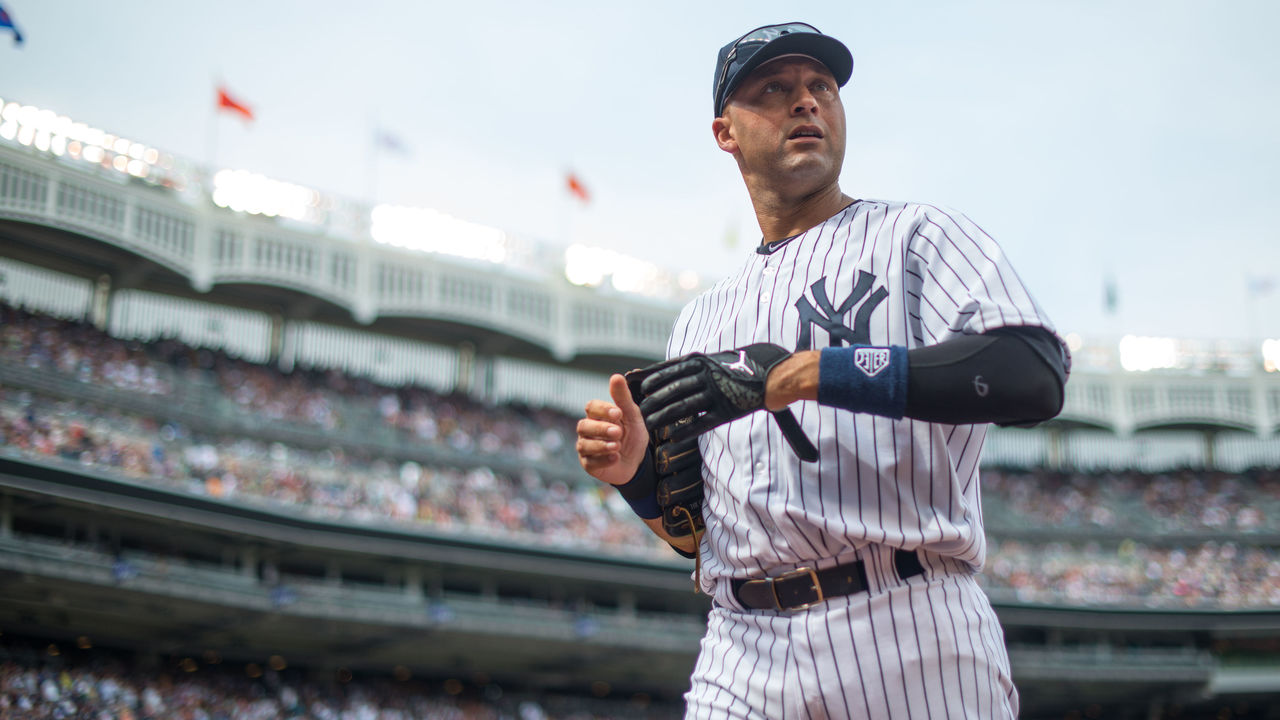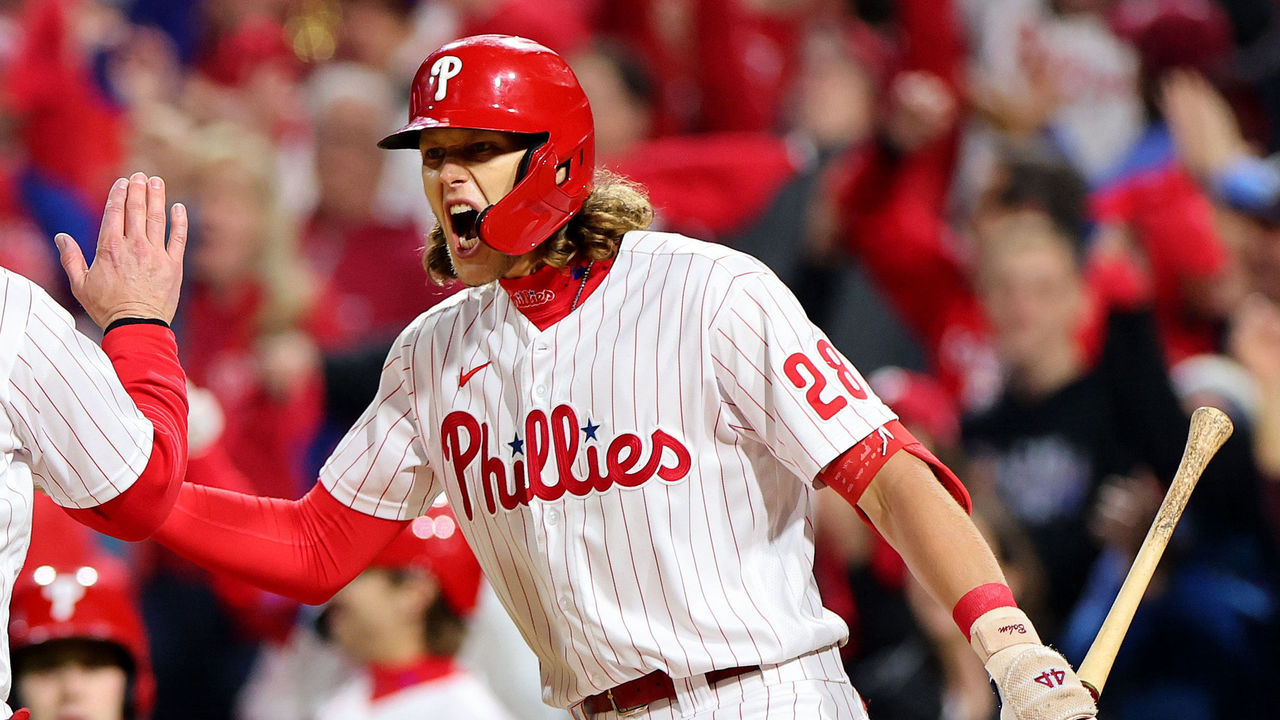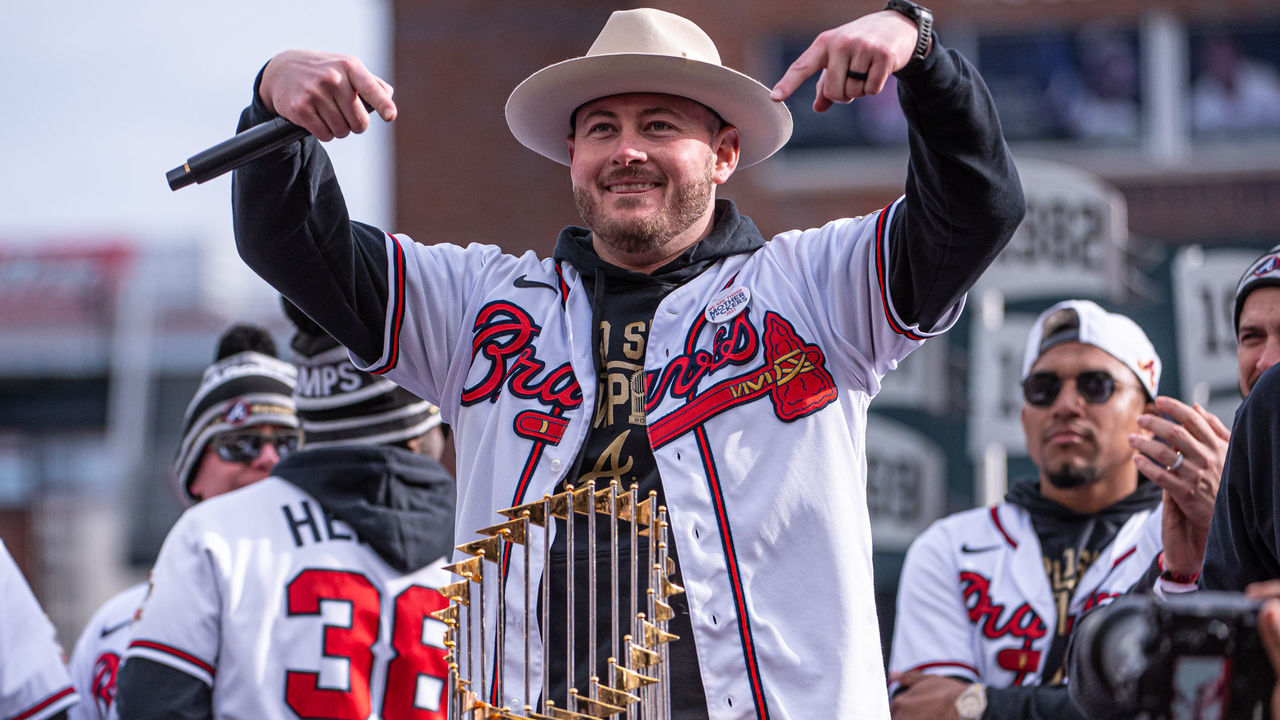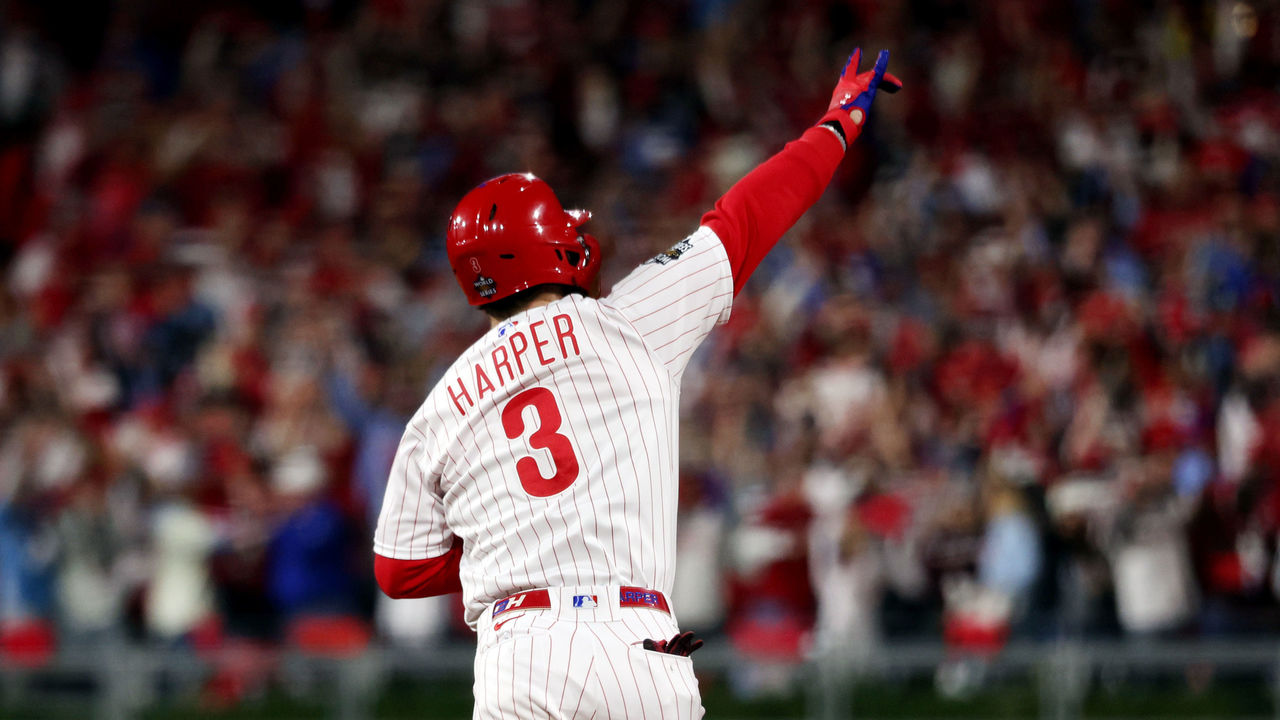Clutch moments exist. What about clutch players?
Down by a run with a man on in the eighth inning of Game 5 of the National League Championship Series, Bryce Harper unleashed one of his controlled, violent swings. "The swing of his life," as FOX broadcaster Joe Davis called it. Harper smashed a Robert Suarez 99-mph fastball over the left-field wall. The Citizens Bank Park crowd rose to its feet, tracking the ball's arc, reaching a frenzied state when the ball disappeared into a red-clad mob.
There's no doubt it was a clutch moment. The swing sent the Phillies to their first World Series since 2009 and propelled Harper to an NLCS MVP award. In the World Series, Harper kept up his torrid play, hitting his sixth home run of the playoffs in Game 3.
There's no doubt Bryce Harper is making clutch contributions this postseason. But is he a clutch player?
One of the early battlegrounds between analytical and traditional viewpoints was this debate, whether clutch players existed. No one was debating whether there were clutch plays - contributions that have outsized impacts in determining the outcome of a game. But were there players who had the skill more than others? Were there players who performed better in high-stress situations than low-stress ones? Did the so-called "clutch gene" exist?

The term "clutch" appears to originate in baseball and dates back to the 1920s, meaning a "moment when heroics are required." One theory has it that a sportswriter was influenced by “Invictus," a poem in which English writer William Ernest Henley wrote: "In the fell clutch of circumstance, I have not winced nor cried aloud."
Questioning the idea of clutch players goes back decades, too.
In 1977, Dick Cramer, writing for the Baseball Research Journal, summarized his findings: "Good hitters are good hitters and weak hitters are weak hitters regardless of the game situation. … So fades a legend - but after all, what was really meant when someone was called a 'clutch hitter'? Was he really a batter who didn’t fold under pressure, or was he a lazy batter who bothered to try his hardest only when the game was on the line?"
This view was further tested and gained wide acceptance in sabermetric circles.
Joe Sheehan wrote the following in Baseball Prospectus in 2004:
"All major-league players have a demonstrated ability to perform under pressure. They've proven that by rising to the top of an enormous pyramid of players, tens of thousands of them, all trying to be one of the top 0.1% that gets to call themselves 'major leaguers.' ... The guys who are good enough to be in the majors are all capable of succeeding and failing in these situations, and they're as likely to do one or the other in the clutch as they are at any other time."

Many think of Derek Jeter as a clutch player.
Jeter's an interesting study because of his reputation for playoff magic and because he also owns the most postseason plate appearances (734) in MLB history.
He produced a .310/.377/.440 slash for his career in the regular season (119 wRC+). In the postseason: .308/.374/.465 (121 wRC+).
A clutch player? Or simply a great player?
David Ortiz produced a .286/.380/.552 slash line in the regular season (140 wRC+). In the postseason: .289/.404/.543 (144 wRC+).
One could argue he's essentially the same player in lower- and higher-stakes environments, though one could also argue he generally faced a higher level of pitching in the playoffs.
Babe Ruth?
Regular season: .342/.472/.690 (197 wRC+).
Postseason: .326/.467/.744 (200 wRC+).
While Harper's hit .373/.439/.797 this postseason, he hasn't always delivered this time of year. He hit .130 in his first postseason in 2012, .235 in 2016, and .211 in the 2017 playoffs. Small samples, yes, but he doesn't always rise to the occasion - no one does. Even Michael Jordan acknowledged he missed plenty of game-winning shots.
Those are individual examples. But in looking at wider samples, the evidence supporting the idea of clutch players is also largely lacking.
FanGraphs houses a metric called "clutch" that measures "how much better or worse a player does in high-leverage situations than he would have done in a context neutral environment." It employs win probability added (WPA) and leverage index (LI) to create the clutch value. The basic idea: a batter who hits .300 in a non-clutch situation and .300 in a clutch situation is considered to be clutch neutral.
A clutch score of 2.0 or greater in a given season is considered excellent, while -2.0 or worse is considered poor, a choker. Those scores can vary year to year, but only 16 of 1,056 hitters to record 1,000 plate appearances this century averaged a score of 1.0 or better per 600 plate appearances, while 46 produced a -1.0 score per 600 plate appearances.
What that means: The vast majority of hitters were near clutch-neutral status throughout their careers.
(Interestingly, one of the 16 who's been above average in clutch situations through his career is the Phillies' Alec Bohm, who homered in Game 3 of the World Series.)

Twenty years into the Moneyball era, so much about the game is quantified. But not everything is known and measurable. In that time, there's also been a flurry of hiring of mental skills coaches and sports psychologists, to help players and teams perform better, and perform better under pressure.
We asked longtime mental skills coach Patrick Cohn of Peak Performance Sports if there are clutch players.
"We have a saying that the cream rises to the top. In the playoffs, your best players are going to rise to the top. What’s a clutch player? Why does the cream rise to the top? A clutch player is someone who can simply do their job when the game is on the line, or the series is on the line," said Cohn, who has been in the field for 30 years. "They just continue to perform the way they are capable of. A player not as clutch, a lesser-skilled player, they will be affected more by their mental approach. They will feel more mental expectations. They will feel more pressure. They will try too hard. They will try to be perfect, which doesn’t help their performance.
"So I would say, yeah, there are definitely clutch players, but it's the best players that are going to rise to the top in a playoff situation. If you look at any sport - Michael Jordan, someone like Tiger Woods, Annika Sorenstam - they are clutch players but also very top-level performers."
To that point: Examine a list of MVPs of the World Series, NBA Finals, and Super Bowl, and the names attached are generally players who were or are stars.
Perhaps there's something to Phillies general manager Dave Dombrowski's preference for top-end players in building teams that excel in October. Dombrowksi has taken a record four different teams to the World Series.
Dave believes that players with a proven track record have special qualities and will rise to the occasion...
— Brian Bannister (@RealBanny) October 23, 2022
…Especially in the postseason.
This occurred when we won the World Series in 2018 and it’s occurring for the Phillies right now.
Cohn agreed that overcoming pressure situations is one reason professional athletes rise through the Darwinian weeding-out process to reach the top of their sports, but "they are human and they are not robots," he added. He said anyone is susceptible to losing confidence, to falling in a slump. Players, of course, try to limit that period of underperformance.
"Things happen. Look at Tom Brady and his situation: going through a divorce that’s going to affect his mental state when he goes out and plays," Cohn said. "Stuff happens in life where it can affect a player's perception, and thoughts, and how they play the game."
Matthew Schweickle studies performance under pressure at the University of Wollongong's school of psychology in Australia. We asked him if clutch players exist.
"There is very little evidence - across both baseball and basketball, where this research has been conducted most - that major-league players improve upon their statistical averages in 'high-pressure situations,'" Schweickle wrote in an email reply. "It is true that we are talking about a sample of athletes that - broadly - have developed skills and strategies to perform under pressure.
"Yet, on the other hand, we do see high-level athletes 'choke' under pressure, so they are not impervious to the effects of pressure."
We've seen high-level athletes falter under pressure: Greg Norman at the 1996 Masters, Mikaela Shiffrin at the Winter Olympics, even pitchers dealing with the yips.

If at least some top-level athletes break under pressure, does it stand to reason then others reside on the opposite end of the spectrum and excel when pressured?
Jason Kuhn is an ex-Navy SEAL and performance coach who was key in helping Tyler Matzek overcome the yips. We asked him if a clutch gene exists or if such performance can be learned.
"Is there a (clutch) gene? I have no idea, I'm guessing probably not - other than certain personality traits might be more aligned with performing under pressure," Kuhn told theScore. "But I do think there are ways we can develop and increase our capability and consistency in high-leverage situations."
Like Cohn's belief that being clutch is tied to players "doing their job" under pressure, Kuhn defines performance, in general, as "an ability to relentlessly execute fundamentals under extreme stress."
Kuhn trained Matzek in extreme pressure situations. More and more professional teams and players are hiring mental skills coaches and sports psychologists to try and improve. When the South Carolina Gamecocks won two straight NCAA baseball title games in 2010 and 2011, they were one of the few known teams to have a sports psychologist, the late Ron Kasper, in the dugout working with players regularly and even in games.
Studies and data cast doubt on the idea of a clutch player. But one of the difficult components about evaluating clutch performance, Schweickle says, is simply defining what it is, and what needs to be evaluated.
"When we only look at situational indicators of pressure - playoff matches, certain match conditions - we are assuming everyone experiences and feels pressure in the same way at that moment, which may not be the case," he wrote. "(While) it's often more difficult to capture, we need to have athletes' perspectives of their experience of pressure to accurately measure this concept."
There are other considerations, too.
For instance, Cohn said a common performance stressor he encounters is a veteran player coming off injury who feels he must perform well if his replacement is excelling. There could be tremendous pressure in such a situation, but it wouldn't be measured by an outsider studying clutch performance.
Trickier still is that athletics is a zero-sum game: there's a winner and a loser. Even if everyone in the major leagues perfected their ability to perform under pressure, there would still be a winning and losing team each game, and players contributing differently to those efforts.
Cohn said his mentor, the late sports psychologist Ken Ravizza, felt that most athletes generally sat at a "seven or eight" on a 1-to-10 scale in terms of their performance level in games.
"Clutch performers can get closer to that 10 when the game is on the line and it's an important series," Cohn said.
Harper's teammate Nick Castellanos said he's had a different level of focus in the playoffs.
For years, he's been one of the poorest outfield defenders in baseball. Yet, in the playoffs, he produced his four best plays of the calendar year, as MLB.com's Mike Petriello noted.
"I think that a lot of times I have trouble keeping attention during the regular season, every day, for nine innings," Castellanos said during an in-game TV interview during Game 1 of the World Series. "But with the postseason, this kind of baseball is incredible, you don't have a choice but to be locked in, watching swings, watching balls come off the bat, I think that's just kind of why I'm playing better."
The Nick Castellanos Defensive Highlight Reel added another play yesterday.
— SIS_Baseball (@sis_baseball) November 2, 2022
We track "Good Fielding Plays"
(web gems + smart defensive plays)
Nick Castellanos had 4 of them in the 2022 regular season (and ranked T-last among RF in Runs Saved).
He has 3 in the 2022 postseason pic.twitter.com/rNiHiqXYXP
Castellanos perhaps argues against Cramer's point: there are lazy fielders who bother to try their hardest only when the game is on the line.
That brings us back to Harper. What does it mean if he reaches his "10" level in the playoffs?
There's no doubt Harper is a great player. He was a teenage wunderkind, a No. 1 overall pick who lived up to the hype. He's won two MVPs. There's no doubt he's compiling plenty of clutch plays this October. But is he a clutch player?

"Individual clutch performances can be viewed to exist," Schweickle wrote. "As for 'clutch players' - this is a more difficult question and may require a rethink of what a 'clutch player' is."
Harper took the swing of his life in the final game of the NLCS. The context defined its importance. But that swing, connecting with a 99-mph fastball on the outside corner and slashing it over the opposite-field fence, not just any player could do that - only a great one.
Travis Sawchik is theScore's senior baseball writer.